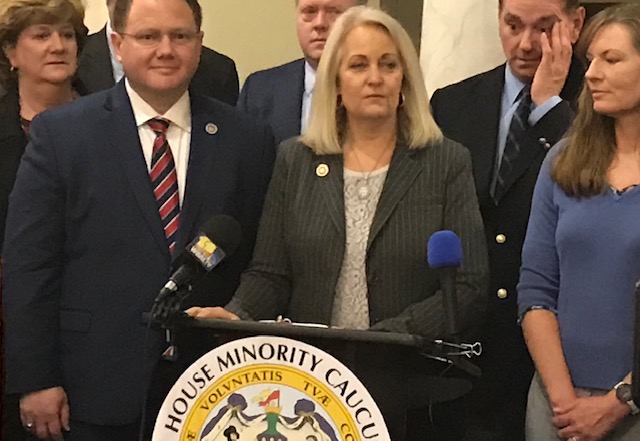@BryanRenbaum
[email protected]
House Minority Whip Kathy Szeliga, R-Baltimore-Harford, on Thursday urged action on legislation to help teachers deal with students who consistently display disruptive behavior in school.
“There are students in classrooms across our state who are regularly disruptive to a point where teachers cannot teach and students cannot learn. This isn’t the run-of-the-mill disruptions. We’re not talking about passing notes and chewing gum. We’re talking about arguing, fighting, cussing at teachers, physically and verbally assaulting teachers and other students. Teachers need the tools in the toolbox to take their classrooms back without fear of administration interference,” Szeliga said at a news conference at the Lowe House Office Building in Annapolis accompanied by about a dozen colleagues.
Szeliga spoke in favor of five Republican-sponsored bills that are aimed at addressing disruption in the classroom. They are: the Right to Teach Act, the Good Teacher Protection Act, the Predator Free Schools Act, the Accountability in Education Act, and the Right to Learn Act.
The first bill would allow for alternative education arrangements for students who are regularly disruptive. They would be allowed back in their regular classrooms when their teacher believes they are no longer prone to disruptive behavior. The second bill would provide civil immunity to teachers and administrators who take appropriate action to stop acts of violence in schools — such as intervening to break up a fight between students. The third bill would provide for alternative education arrangements for students who are registered sex offenders. The fourth bill would establish a hotline in the inspector general’s office in which teachers, parents and students can reports disruption and violence “without fear of retribution,” Szeliga said. The fifth bill would allow students who are attending low-performing schools to transfer to better-performing schools.
Thursday’s news conference also included Nicole Landers, a pediatric nurse and school safety advocate. Landers said her two children no longer attend Baltimore County schools due to extreme acts of harassment and violence.
“This is the note that I found on my nine-year-old son sitting in the dark after a year of bullying and assault in school that was unrelenting,” she said, holding up the note. “It says: ‘Kill me. I mean nothing. I have issues.’ ”
Landers described how the incident affected her son. She said the school did not take appropriate action to remedy the situation.
“He wanted to die. He was prepared to take his life because the school would not separate the bullies from him. No matter how much pleading I did, I was repeatedly told that the offending students had rights that superseded my own son’s.
“I could not make sense of this. It’s unfair that my son lost a year of educational opportunity at the hands of students who would not cooperate with classroom rules. The only explanation I was offered, or option, was to move my son to another class. So, he was to be punished for another student’s behavior.”
Landers said her daughter was sexually assaulted by a fellow fifth-grader. Landers held up a note her daughter wrote and presented to U.S. Education Secretary Betsy DeVos about the incident but said it was too graphic to read out loud. The school did not take appropriate action in that situation either, Landers said.
“She was asked to sit in math class, English, science — with this student. She lost an entire year of learning.”
Landers noted that the U.S. Department of Education’s repeal of Obama-era federal guidance regarding discipline guidelines for schools — thereby allowing states more leeway to enact their own policies. The guidance had been issued to address racial disparities in school suspensions and was rescinded in December 2018.
“There could be no legislation entered to take action against undisciplined students because the federal guidance said that they [schools] weren’t allowed to do that. They had to reduce their suspension numbers.”
Del. Marc Korman, D-Montgomery, told MarylandReporter.com he has not yet seen the education bills.
“I can’t comment on something I haven’t seen.”
MarylandReporter.com then described to Korman the bill allowing for chronically disruptive students to be removed from the classroom.
“I’d want to see the bill and how they’re defining that and just making sure that we’re giving people their fairness and due process in that situation. But I haven’t read the bills yet. So, I’ll give my colleagues the courtesy of reading their bills before I jump to any conclusions either way.”
Legislative Black Caucus Chair Darryl Barnes, D-Prince George’s, did not respond to a request for comment about the bills by MarylandReporter.com by the deadline for this story.




Bring back the residential reform schools where there is very strict discipline as well as education…
Also, families should be given the money given per student for their children to attend these failed schools to be able to send them to private schools and to homeschool…
This didn’t happen when corporal punishment was part of being a disciplined student in a disciplined school environment…
Of course, there’s always getting a GED…